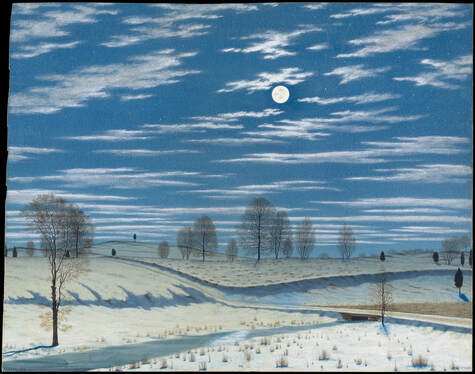ars poetica
A walk through a field carrying my mother’s wounds
The glorious gap in my grandmother’s teeth
The iron swallowing the wrinkles from my sister’s dress
My stubborn brothers throw their heads back in laughter
I marvel the harvest of their uncombed kinks
A phantom of a father the tremor of his voice
My mother silent exorcist on a good day
The roaches praising the empty of the night
The oven open its yawn devours the brittle cold
Winter unyielding it wills to break
My grandmother and her children squatters in an empty brownstone
The passing down of how to thaw the absence of money We do not count
The lessons of growing up without
Instead—
My great-aunt remembers her mother a master of bearing joy
While cleaning others’ homes how ample humility runs in the
caretaker
When she is forced to forget everything I watch her in a facility
The quiet blink of her eyes a drowning past she’s unable to tell
me When she dies I visit her home the land
expands a restless root
She is buried next to her husband
Who is buried next to her daughter who is buried next to her son
Who is not buried next to his nephew who dies
Many years later in utter silence a memory revives an
ancestor Who unearths itself to
marvel the vast and fertile infinite
The first line of this poem is inspired by Sarah Borjas’ poem “I Know the Name of the Desert.”
The glorious gap in my grandmother’s teeth
The iron swallowing the wrinkles from my sister’s dress
My stubborn brothers throw their heads back in laughter
I marvel the harvest of their uncombed kinks
A phantom of a father the tremor of his voice
My mother silent exorcist on a good day
The roaches praising the empty of the night
The oven open its yawn devours the brittle cold
Winter unyielding it wills to break
My grandmother and her children squatters in an empty brownstone
The passing down of how to thaw the absence of money We do not count
The lessons of growing up without
Instead—
My great-aunt remembers her mother a master of bearing joy
While cleaning others’ homes how ample humility runs in the
caretaker
When she is forced to forget everything I watch her in a facility
The quiet blink of her eyes a drowning past she’s unable to tell
me When she dies I visit her home the land
expands a restless root
She is buried next to her husband
Who is buried next to her daughter who is buried next to her son
Who is not buried next to his nephew who dies
Many years later in utter silence a memory revives an
ancestor Who unearths itself to
marvel the vast and fertile infinite
The first line of this poem is inspired by Sarah Borjas’ poem “I Know the Name of the Desert.”
|
Henry Farrer. Winter Scene in Moonlight, 1869. The Metropolitan Museum of Art.
|
Tatiana Johnson-Boria (she/her) is a writer, artist, and educator. Her writing explores identity, inherited trauma, and what it means to heal. Her work has been selected as a finalist for the Prairie Schooner Book Prize, the Black Warrior Review Poetry Contest (2020), and others. She is a 2021 MacDowell Fellowship recipient and a recipient of the 2021 Brother Thomas fellowship. She has received honorable mention for the 2021 and 2020 Academy of American Poets Prize and is a 2017 Pushcart Prize nominee. She is also a 2021 Tin House Scholar. Find her work in or forthcoming at Ploughshares, Kenyon Review, Pleiades, and others.

